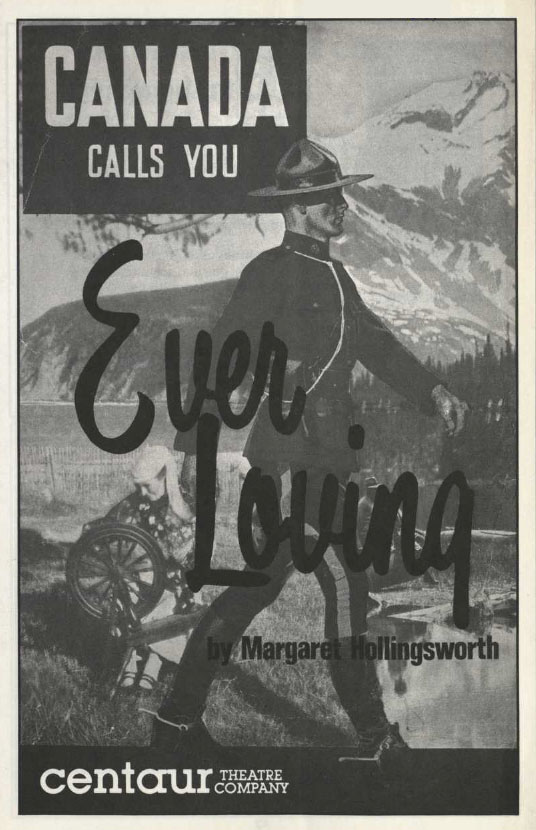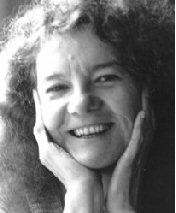Canadian Theatre Encyclopedia
Ever Loving

Drama in two acts by Margaret Hollingsworth, premiered at the Belfry Theatre, November 13, 1980, directed by James Roy, set and costume design by William Heslup, lighting design by Bryan Francis, with William Dunlop, Angela Fusco, Alison MacLeod, Blaine Parker, Robert Seale, and Donna Carroll White. It was subsequently performed throughout the country including at Centaur Theatre (1981, with Morris Panych as Paul Tomachuk), Neptune Theatre, and Phoenix Theatre.
In 1945 three war-brides, one from England, one from Scotland, and the third from Italy, travel to Canada to join husbands whom they barely know, searching in different ways for a physical and psychological home. Canada is seen through the eyes of outsiders (Hollingsworth herself was born in England).
The action takes place between 1938 and 1970, but the structure is non-linear. Hollingsworth breaks up both space and time, moving from the present to significant episodes in the past lives of the women. The juxtaposition of past and present effectively dramatizes the ironies inherent in the differences between expectations and reality. The shift in focus of the play from one couple to another provides an insight into their different social contexts, while showing their similar aspirations for an opportunity to realize their ambitions and dreams. The flashbacks are interspersed with fantasy scenes that provide a glimpse into the psyches of the three women.

Each scene is identified by a pop song contemporary to that period, which may set the mood, but which may also be an ironic comment on the events. This irony is apparent at the beginning of the play, set in a Niagara Falls restaurant, where Chuck is singing "I Never Promised You a Rose Garden" to his newly arrived wife. As the two war brides Ruth and Diana travel through the Northern Ontario wilderness, Chuck plays "Sentimental Journey" in the background.
By juxtaposing the lives of the three couples, Hollingsworth also suggests their different social assumptions, cultural contexts, and the reasons why they either stay in their marriages or leave. Two of the women compromise their dreams in order to sustain a degree of security and to maintain a home, and they have achieved to a certain extent a sense of belonging. Luce on the other hand, decides to abandon her marriage.
In Ever Loving Hollingsworth provides a portrait of Canada as still a colonial country: a country of immigrants, each group bringing a different language and culture to a wilderness. Even the husbands, who in some ways personify a patriarchal repression that is inherent in the act of colonizing, are themselves immigrants, trying with little success to establish their own sense of identity as Canadians. They resent the patronizing superiority and authoritarianism that they detect in the "mother country." The young idealistic communist Paul vows to change the class system in Canada, in which his Ukrainian father is treated with contempt by the British immigrants: "When this war's over, there's a few things gonna change ... it's the end of imperialism, all that stuff's dead. Canadian aren't licking any more boots..." Even after his idealism has faded, he attempts to eliminate any remnants of British "civilisation" which Diana may try to impose on their lives, such as an English garden.
The play begins in the "centre of Canada", southern Ontario, and moves back and forth to the "regions" -- the prairies, the Maritimes. The set for the second act suggests three railway station: the country is linked tenuously only by the railway. A portrait of Canada from the point of view of new Canadians begins to emerge, the optimistic post-war propaganda countered by specific lived experiences. Any romantic notion of nature or a land of opportunity is completely erased. A final toast to Canada at the end of the play provides another ironic comment: no one knows what they are toasting.
The critics were divided on the play. Bob Allen, of the Vancouver Province, wrote, "Margaret Hollingsworth has been called a 'playwright of potential'...That potential has now matured, and as a result, Victoria's Belfry Theatre has a significant show on its hands." However, Maureen Peterson of the Montreal Gazette, wrote on the play's Montreal production, "Six talented performers...poured their considerable talent down the drain...The problem is that Margaret Hollingsworth never finished Ever Loving."
Reading: "Ever Loving", Modern Canadian Drama, Volume One, ed: Richard Plant. Toronto: Penguin, 1984.
Commentary by Anne Nothof, Athabasca University.
Last updated 2022-01-20

